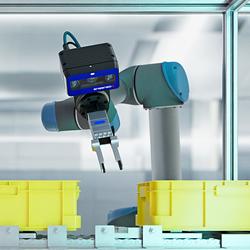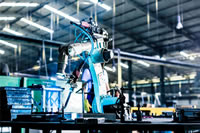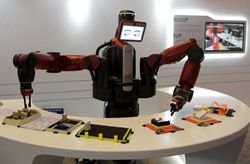As China Invests in Robotics, iRobot and Other Companies Eye Deals
Jeff Engel for Xconomy: China emerged as a manufacturing powerhouse over the past few decades, thanks in large part to a deep pool of cheap labor. Now, the country is investing heavily in factory automation, and Boston-area robotics companies and their allies smell opportunity.
Executives from 11 New England robotics firms will travel to several cities in China later this month on a trade mission aimed at sparking business deals and more technology collaboration between the U.S. and China.
The trip is being organized by InTeahouse, along with local nonprofit robotics support group MassRobotics. Cont'd...
Full Press Release:
Chinese robotics makers feast on government subsidies
Li Liuxi and Chen Na for Caixin Online: Local governments pumped hundreds of millions of yuan into the robotics industry in the first half of the year, helping to boost profits by as much as 60 percent in those companies rushing to take advantage of the generosity.
With strong support from Beijing, China has embarked on a robot-building frenzy in the last two years in an effort to move beyond traditional manufacturing. But as often happens in industries targeted for development, poorly designed incentive programs often lead to abuse that results in millions of dollars in wasted funds.
Similar waste in China's electric-vehicle and renewable-energy sectors has led to the buildup of huge new capacity that is sometimes unusable or of such low quality that no market exists for the products.
In the case of robotics makers, Caixin found government funding made up a large portion of profits for a dozen manufactures listed in Shanghai, Shenzhen and Beijing in the first six months of this year. Cont'd...
Technology gap gives foreign firms the edge in China robot wars
BY GERRY SHIH for Reuters: In a cavernous showroom on the outskirts of this port city in northeastern China, softly whirring lathes and svelte robot arms represent Dalian Machine Tools Group's (DMTG) vision of an automated future for Chinese manufacturing.
On closer inspection, however, most of the machines' control panels bear the logos of Japan's FANUC Corp or the German conglomerate Siemens.
The imported control systems in DMTG's products – used in the assembly of everything from smartphones to cement trucks – are symbolic of the technology gap between Chinese and foreign industrial automation firms, just one of several challenges facing China's ambition to nurture a national robotics industry.
Chinese robotics firms are also grappling with a weakening economy and slumping automotive sector, and industry insiders already predict a market bubble just three years after the central government issued policies to spur robotics development.
"Last year everybody thought they could produce a robot," said Alan Lee, director of Asia sales and business development at Boston-based Rethink Robotics. "When you have market saturation you'll have filtering and M&A. These guys will be the first layer to suffer."
It is a storyline familiar from other new industries such as solar panels: Beijing's policies and subsides trigger a wave of low-margin, low-cost contenders to rush into the market, where, with no meaningful technology of their own, they struggle to compete on price alone. Cont'd...
194 Chinese Robot Companies
The robotics industry is booming in China. Companies are deploying thousands of robots in all types of factories, particularly in the auto industry. Chinese companies that manufacture robots and their components are also growing. This article will focus on the 107 makers of those robots.
China's Hunger for Robots Marks Significant Shift
By TIMOTHY AEPPEL and MARK MAGNIER for WSJ.com - Having devoured many of the world’s factory jobs, China is now handing them over to robots.
China already ranks as the world’s largest market for robotic machines. Sales last year grew 54% from a year earlier, and the boom shows every sign of increasing. China is projected to have more installed industrial robots than any other country by next year, according to the International Federation of Robotics.
China’s emergence as an automation hub contradicts many assumptions about robots and the global economy.
Economists often view automation as a way for advanced economies to keep industries that might otherwise move offshore, or even to win them back through reshoring, since the focus is on ways to reduce costly labor. That motivation hasn’t gone away. But increasingly, robots are taking over work in developing countries, reducing the potential job creation associated with building new factories in the frontier markets of Asia, Africa or Latin America. Cont'd...
SCHUNK China: Gripping New Horizons
Since 2003, SCHUNK has been represented in China with its own subsidiary, and has grown consistently since that time.
Records 1 to 6 of 6
Featured Product

3D Vision: Ensenso B now also available as a mono version!
This compact 3D camera series combines a very short working distance, a large field of view and a high depth of field - perfect for bin picking applications. With its ability to capture multiple objects over a large area, it can help robots empty containers more efficiently. Now available from IDS Imaging Development Systems. In the color version of the Ensenso B, the stereo system is equipped with two RGB image sensors. This saves additional sensors and reduces installation space and hardware costs. Now, you can also choose your model to be equipped with two 5 MP mono sensors, achieving impressively high spatial precision. With enhanced sharpness and accuracy, you can tackle applications where absolute precision is essential. The great strength of the Ensenso B lies in the very precise detection of objects at close range. It offers a wide field of view and an impressively high depth of field. This means that the area in which an object is in focus is unusually large. At a distance of 30 centimetres between the camera and the object, the Z-accuracy is approx. 0.1 millimetres. The maximum working distance is 2 meters. This 3D camera series complies with protection class IP65/67 and is ideal for use in industrial environments.
Robotics and Automation - Featured Company

PNY
PNY Professional Solutions provides customers with powerful tools to manage heavy workloads. PNY offers NVIDIA Professional, Consumer GeForce RTX, and Data Center GPU Solutions, along with PNY Memory upgrades and Solid-State Drives. All PNY products are designed and built with system integrators in mind to provide advanced application performance, top productivity, and greater power efficiency.





